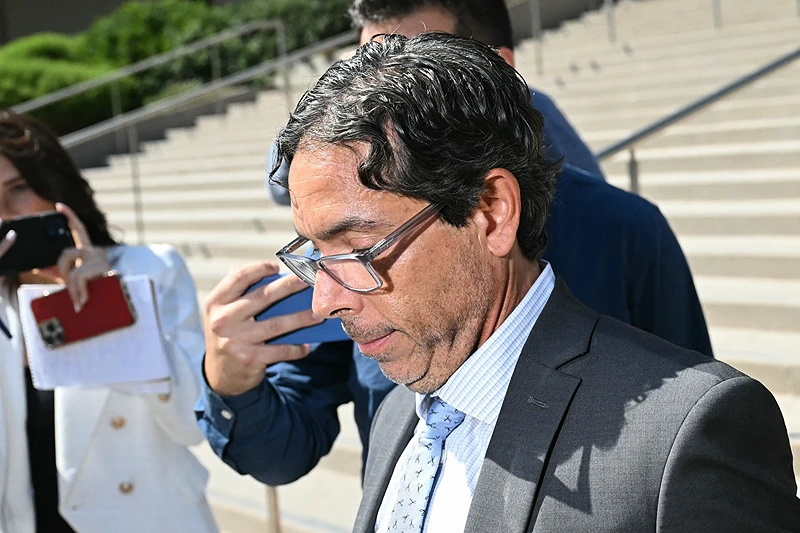
OAN Staff Brooke Mallory
1:02 PM – Thursday, October 3, 2024
One of the two medical professionals accused of contributing to Matthew Perry’s drug-related death entered a guilty plea to illegally providing the “Friends” actor with ketamine in exchange for cash payments.
Doctor Mark Chavez made an appearance in federal court in Los Angeles on Wednesday to discuss the plea deal.
Chavez admitted to the judge that he supplied ketamine for money and understood the purpose of the conspiracy before pleading guilty to one count of conspiracy to distribute ketamine resulting in death and serious bodily damage.
Chavez’s sentencing is scheduled for April 2nd, 2025, and he remains out on bond.
Chavez’s attorney, Matthew Binninger, maintained that the doctor has “accepted responsibility.”
“He [pleaded] guilty. He admitted a lot of facts on the record. He’s cooperating with the government,” Binninger told reporters after Wednesday’s hearing. “He’s taken this incredibly seriously.”
Originally, Chaves had pleaded not guilty during his arraignment back in August.
“He is trying to do everything in his power to right the wrong that happened here,” Binninger told reporters following the arraignment. “He is doing everything in his power to cooperate, to help in this situation, and he’s incredibly remorseful.”
In exchange for a reduced sentence, Chavez agreed to give up his medical license. According to Binninger, Chavez began the process of surrendering his medical license on Wednesday.
Additionally, prosecutors said that Chavez could still spend up to ten years behind bars.
Following 54-year-old Perry’s death on October 28th, 2023, whose life was taken after a ketamine overdose at his house, Chavez is one of five individuals facing federal prosecution.
According to authorities, the “Friends” actor was found unconscious in his Los Angeles home’s jacuzzi. According to the postmortem report, ketamine’s acute effects were the cause of his death.
“Though deaths from ketamine overdose are relatively rare when the drug is used on its own, the risks become greater when ketamine is used with other drugs that also impact breathing, such as alcohol or other sedatives,” according to the Oxford Treatment Center. “Whenever substances are taken together, the effects and risks of each substance may be amplified, leading to more severe health effects.”
The Department of Justice also believes Chavez was part of an underground criminal network that utilized Perry as a personal piggy bank by unlawfully selling him ketamine.
According to prosecutors, Chavez, 54, acknowledged providing ketamine to Dr. Salvador Plasencia, 42, a licensed physician he has known for at least 20 years, with the knowledge that Perry, who was battling a ketamine addiction, would purchase it.
The Department of Justice believes that Jasveen Sangha, 41, a woman dubbed “The Ketamine Queen,” is one of the primary defendants in the case along with Plasencia. She is charged with selling Perry the ketamine batch that ultimately led to his death. When they were arrested in August, they both entered not guilty pleas.
In court filings, Eric Fleming, 54, also acknowledged that he supplied Perry with ketamine, and Kenneth Iwamasa, 59, Perry’s live-in assistant, acknowledged administering the drug to him.
A plea agreement submitted on August 15th in Chavez’s case states that Plasencia called Chavez on September 30th, 2023, requesting ketamine for Perry, who was “willing to pay a premium.”
Chavez confirmed he did receive it—even sending a picture of ketamine lozenges—and stated he was willing to hand over the ketamine in return for money, according to the plea deal details.
Chavez retained a minimum of twelve ketamine vials before his departure from a San Diego ketamine infusion clinic in July 2023. He also consumed 30 ketamine lozenges that he had obtained by submitting a false prescription without the patient’s knowledge.
Per the plea deal, Chavez retained a minimum of twelve ketamine vials subsequent to his departure from a San Diego ketamine infusion clinic in July 2023. He also took 30 ketamine lozenges that he had obtained by submitting a false prescription without the other patient’s knowledge.
As part of the purported plan, Chavez and Plasencia met three times, as stated in the plea deal. Chavez acknowledged giving over nine ketamine lozenges and at least 22 vials of liquid ketamine, all of which he knew Perry would use.
However, Chavez soon discovered that the California Medical Board was investigating an allegation related to how he had improperly taken ketamine from his prior ketamine clinic, according to the plea bargain.
Chavez then informed Plasencia that he would no longer be able to obtain any ketamine to sell to Perry.
According to the plea bargain, Chavez denied being in possession of the liquid ketamine retrieved from the clinic during an interview with the Drug Enforcement Administration on October 19, 2023.
He did acknowledge, however, writing a fictitious prescription for ketamine lozenges, previously claiming that he had thrown them out after they melted inside his car.
“At all relevant times during the interview, defendant Chavez concealed from investigators that he had, in fact, transferred ketamine to co-conspirator Plasencia,” the plea agreement stated.
Stay informed! Receive breaking news blasts directly to your inbox for free. Subscribe here. https://www.oann.com/alerts

